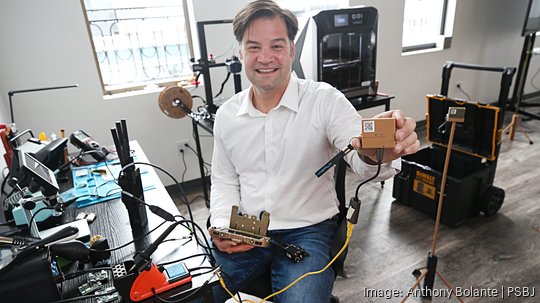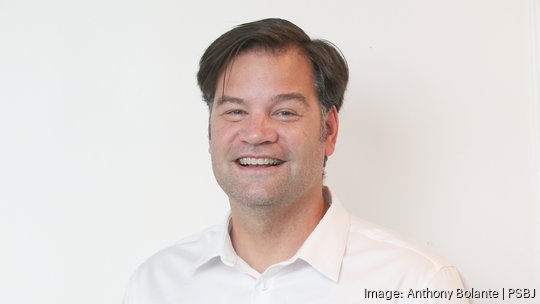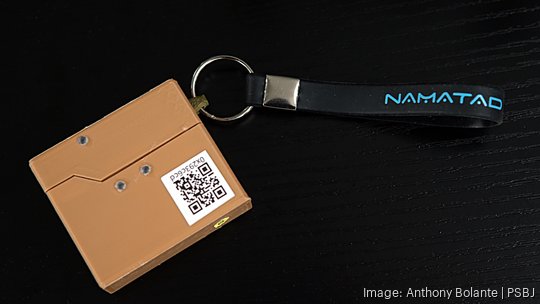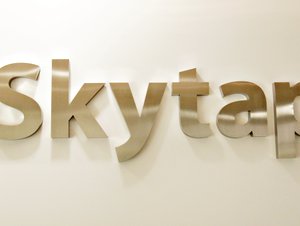
Matt Tolentino speaks the language of his clients.
Tolentino, the founder and CEO of the Tacoma-based tracking device company Namatad, served five years in the Navy during the 1990s. Namatad is selling its devices to special forces soldiers, and Tolentino has an understanding of how military units function.
“I’m working with a number of personnel that are on active duty,” Tolentino said. “There’s a little bit of camaraderie there. ‘He was in the Navy. It’s not Army, but the Navy is good enough.’ There’s an understanding there.”
Tolentino finished his undergraduate degree while serving at the Pentagon. After getting out of the Navy, he worked at Intel for about 15 years, after which he got his master’s at the University of Washington and a Ph.D. at Virginia Tech.
In 2018, he founded Namatad, which makes tracking devices designed for areas where GPS doesn’t work, for example underground or subway tunnels. In addition to the military, Namatad is targeting public safety workers, such as firefighters.
The Business Journal spoke with Tolentino about launching his company, fostering veteran-owned businesses and his focus before joining the military.

About Matt
- Age: 47
- Hometown: St. Louis
- Residence: Tacoma
- Education: Bachelor’s degree from the University of Maryland, master’s degree from the University of Washington, and Ph.D. at Virginia Tech (all in computer science and engineering)
- Interests outside of work: Skiing and hanging out with his wife. “I am learning to fly planes now. Flying out of Bremerton. I wouldn’t say very well.”
A day in the life
We asked Matt to break down his typical day:
- 6-6:30 a.m.: Wake up
- 6:30-8 a.m.: Quad-shot cappuccino, email, scheduling, admin time, identify key things to think about at the gym
- 8-9 a.m.: Gym time
- 9:30 a.m.-1 p.m.: Team member sync-ups, meetings with East Coast customers
- 1:30-3:30 p.m.: (Monday/Wednesday) Teach class at UW
- 1:30-3:30 p.m.: (Tuesday/Thursday/Friday) West Coast meetings and engineering time
- 3:30-6 p.m.: West Coast meetings (phone or in-person), engineering and research time
- 6-8 p.m.: Dinner, catch-up with wife and family
- 8 p.m.-midnight: Background research reading, walk the dogs, email, strategy, student meetings, more time with wife
- Midnight: Bedtime
How did you start your company?
I started this work as research I was doing at UW as a professor. I did a whole bunch of work for a couple years on the research side of things. After it became apparent that this could really be put to use by, originally, firefighters, then we started looking at commercializing it.
How did you actually make that happen?
I ended up working with UW to establish the license for the technology and the technique. ... We had some initial small contracts with some fire departments. What really gave us our big start was winning a Phase 1 (Small Business Technology Transfer) grant from the Department of Defense.
Has the business changed at all since you launched it?
We used to focus primarily on dynamic, real-time tracking of anybody who is wearing one of our devices. Now we still do that, but we’re also pivoting over to focusing on accountability in terms of ensuring that if something happens and there’s a whole bunch of people in an underground space, that they know where they all are. It’s difficult because it has to be 100%. You can’t lose anybody, so it has to be just rock solid.

How can we foster more veteran-owned businesses in the Puget Sound region?
Funding. I know that’s the problem down here in Tacoma. There’s lots of interest, and I think it’s the same in Seattle.
What else?
Programs that can help educate veterans on what they can do. The education part is critical, particularly for enlisted personnel, but even for those in the officer ranks. It’s a different mindset. It transfers really well. The structure and regimented approach of the service transfers really well. You have people who are pretty organized and used to following rules and procedures. Introducing them and saying this is something you can do, and not just to take a job at some large company.
Did you feel compelled to join a big company when you left the military?
I had that same kind of mentality. Let me go work at Intel because that’s a name I know. And that’s not a bad thing, but I think there are more opportunities — but not if they’re not funded. …People just don’t know. Where do you start? I didn’t know when I left.
Do you ever switch back into military mode and give orders when running Namatad?
Occasionally, but not very often. ... I think demos are one of the biggest things where it starts to feel a little more like that. We have a deadline. We have to go demonstrate this successfully in order to move forward. Let’s figure out the steps we need to do that.
What is one thing most people don’t know about you?
I used to be a professional figure skater. That was before my Navy days, right before I joined the Navy. I skated with some professional shows.
What was that like?
Lots of costumes and sequins. A little bit different than the Pentagon.
This interview has been edited for length and clarity.








